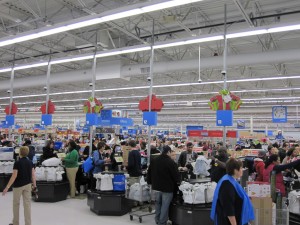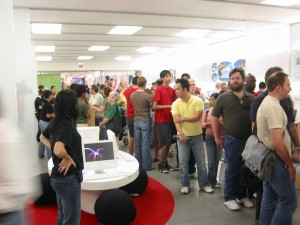A few days ago I happened to stop by the local supermarket during the post-work rush. When I was ready to check out all the regular lanes had long lines. Ordinarily, I wouldn’t mind waiting a few minutes, but on this particular evening I had dinner plans I couldn’t be late for. So I shelled out the extra $6 for the express lane so I could skip the lines.
Pe rceptive readers will surmise that I made up the previous paragraph. In reality, grocery stores don’t impose congestion charges on their customers. Nor do many other types of private businesses. I don’t think I’ve ever had a customer support line offer to expedite my call for a fee. I’ve heard you can get a table faster at some restaurants by bribing the Maitre d’, but I’ve never seen a restaurant formalize the practice. Generally speaking, when businesses experience temporary spikes in demand, they serve customers on a first-come-first-serve basis; they don’t auction off the temporarily scarce capacity to the highest bidder.
rceptive readers will surmise that I made up the previous paragraph. In reality, grocery stores don’t impose congestion charges on their customers. Nor do many other types of private businesses. I don’t think I’ve ever had a customer support line offer to expedite my call for a fee. I’ve heard you can get a table faster at some restaurants by bribing the Maitre d’, but I’ve never seen a restaurant formalize the practice. Generally speaking, when businesses experience temporary spikes in demand, they serve customers on a first-come-first-serve basis; they don’t auction off the temporarily scarce capacity to the highest bidder.
These examples came to mind as I was reading the comments on my recent article about congestion pricing of the highways. One of the striking things about the congestion pricing debate is the stark divide between elites and the general public. Prominent intellectuals from across the political spectrum—from free-market transportation experts to left-wing bloggers are supportive of the idea. In contrast, the readership of Ars Technica, like voters generally, is overwhelmingly opposed. And their criticisms were not limited to the privacy issues that were the focus of my article.
Many supporters of congestion pricing chalk this up to voter ignorance. They assume that people will like congestion pricing once they have a chance to try it. But the supermarket example should make us skeptical of that conclusion. The grocery business is an intensely competitive one. If it were true that people could be won over to this kind of scheme once they had a chance to try it, you’d expect some entrepreneurial grocery store owner to give it a try. Yet I’ve lived in half a dozen different metropolitan areas and I’ve never seen a supermarket that utilized congestion pricing on its checkout lanes.
I think there are two reasons that people hate congestion pricing. First, we have strong and sophisticated social norms, cultivated since we were young children, for waiting in lines. This bit of self-organization is extremely important for the smooth functioning of civil society. We see waiting your turn as an obligation we have to one another, and therefore not as an obligation that a supermarket or transportation agency can waive in exchange for a cash payment. I suspect customers would see people using a tolled checkout lane as breaking an implicit social contract.
 More importantly, customers would be suspicious that the supermarket was deliberately under-staffing the free lanes to gin up demand for the express ones. And this wouldn’t be a crazy suspicion! In the low-margin grocery business, it would be a pretty effective way for a manager to pump up his short-term profits, while the long-term harm to the store’s reputation would be hard for the corporate office to quantify.
More importantly, customers would be suspicious that the supermarket was deliberately under-staffing the free lanes to gin up demand for the express ones. And this wouldn’t be a crazy suspicion! In the low-margin grocery business, it would be a pretty effective way for a manager to pump up his short-term profits, while the long-term harm to the store’s reputation would be hard for the corporate office to quantify.
This latter concern seems particularly relevant to the case of toll roads. The revenue-maximizing pricing schedule is not the same as the congestion-minimizing schedule. An effective congestion-pricing scheme might generate relatively little revenue if people shift their driving to off-peak times (which is the whole point). The operator of a monopolistic toll road will face a constant temptation to boost revenues by limiting throughput on free lanes and jacking up the off-peak toll rates. The widespread voter perception that they’ve “already paid for” many tolled roads through other taxes isn’t exactly right as a matter of fiscal policy, but I think it’s based on a sound intuition: there’s no reason to think the political process will set tolls in a way that’s either fair or economically efficient.
I think there’s a lesson here about the relationship between free markets and individual liberty. Free markets promote freedom by enhancing choice and competition. Consumers patronize those businesses that do the best job of satisfying their preferences, and businesses that fail to satisfy their customers eventually go out of business. Yet here’s a case where, in the name of free markets, advocates of congestion tolling are advocating the use of a market mechanism that private firms in actual competitive markets rarely use.
 I’ve written before about cases where people become so enthusiastic about the “market” part of free markets that they pay short shrift to the “free” part. Markets are a means to the end of satisfying consumer preferences. Markets cater to consumers’ actual preferences, not to the preferences economists think they ought to have. And government services should follow the same philosophy. The fact that some economists have decided that a particular consumer preference is irrational isn’t a good reason to disregard it. And doing so certainly has nothing to do with free markets.
I’ve written before about cases where people become so enthusiastic about the “market” part of free markets that they pay short shrift to the “free” part. Markets are a means to the end of satisfying consumer preferences. Markets cater to consumers’ actual preferences, not to the preferences economists think they ought to have. And government services should follow the same philosophy. The fact that some economists have decided that a particular consumer preference is irrational isn’t a good reason to disregard it. And doing so certainly has nothing to do with free markets.
To be clear, I think there are limited circumstances where congestion tolling makes sense. There’s a lot to be said for the emerging HOT lane model, which has the virtue that the adjacent free lane checks the ability of the tolling authority to charge monopolistic rates. With budgets tight, tolling may be the only way new road construction can be financed in some places. And if the capacity is genuinely new, this can allay public suspicions that they’re being asked to “pay twice” for the same pavement.
But despite the enthusiasm of organizations like the Reason Foundation, the debate about whether to finance road construction using tolls or gas taxes has nothing in particular to do with freedom or free markets. I’m skeptical of any proposal that involves dramatically expanding the government’s ability to monitor and control the peoples’ movements—even if those new powers are deployed in the service of a “market-based” scheme of road pricing.


